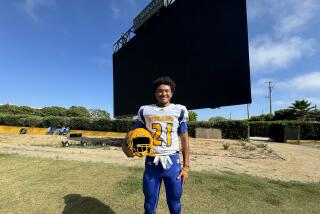Family, Friends Recall Ex-USC Star Williams
- Share via
SHERMAN OAKS — Alvin Williams held up the trophy Saturday and spoke of the star athlete known to his family as Little Man, the kid brother who wowed football crowds nationwide with his speed and grace, and the working man whose death came tragically last week in the mountain wreck of a runaway freight train.
Kevin Williams, 38, a football and track standout at USC who was one of the San Fernando Valley’s most honored athletes, was identified Saturday by the San Bernardino County coroner’s office as one of two brakemen killed Thursday in the fiery derailment of a freight train in the Cajon Pass.
The other crewman was identified as Gilbert Ortiz, 25, of Fullerton, who was the conductor.
“My brother was a standout,” Alvin Williams said, holding the track and field trophy Kevin received in college. “He just achieved so much in terms of his life and his athletic career. I’m gonna miss him.”
For the gifted athlete who was accustomed to life in the spotlight, the end came far from the crowds, on a lonely canyon pass where the freight train carrying dangerous chemicals broke from the tracks in the predawn darkness, spewing skyward a trail of noxious fumes that forced the evacuation of residents and temporarily closed down traffic on a nearby stretch of Interstate 15.
Two bodies were found near the Burlington Northern-Santa Fe tracks late Thursday. The train’s engineer, the only other worker on board, was saved when he was pulled from the wreckage by three rescuers.
Saturday, as the inquiry into the crash continued, a smoky fire licked at the jumbled heap of the freight cars, making it difficult for investigators to reach the heart of the twisted wreck.
“We’re down to basically a ground-zero area now, where a lot of cars are impacted, lying on top of each other, and there’s fire underneath,” said Bill Peters, a spokesman for the California Department of Forestry. Officials hoped to have the last of the fire out by early today, Peters said.
Residents returned home Friday after environmental officials declared the area safe.
But for Alvin Williams, the train wreck has devastated his family.
After learning of the crash early Thursday from his father in Texas, Williams and his wife, Mary, gathered with friends, relatives and railroad officials at the home of his late brother’s girlfriend. They all held hands, hoping that Kevin would be found alive after he was initially reported missing from the wreck.
Word that the bodies had been recovered came suddenly on the television news, stunning the gathering. “It was torture,” Mary recalled.
On Saturday, Williams made final arrangements for the Monday arrival of his parents to attend the funeral, scheduled for this week.
And he talked about the brother--the youngest of two boys and two girls growing up in Pacoima--with whom he had competed throughout his childhood. Alvin Williams, two years his brother’s senior and a himself a former varsity quarterback at San Fernando High, saw his little brother go on to heights that amazed everyone but Alvin.
“Everybody called him ‘Little Man.’ The name came from my father, who thought Kevin looked like a little man in a baby’s body.”
At 5 feet, 8 inches tall, Kevin Williams later became known to high school teammates as the Water Bug, or Bug for short, when he began making a name for himself as San Fernando High’s resident speed demon in the mid-1970s. And he was fast on the track as well as the football field.
That was the heyday of San Fernando football, when Williams shared the limelight with two other famous backfield standouts, Kenney Moore and Charles White. The trio were named L.A. City tri-players of the year before continuing their careers at USC. White went on to win the Heisman Trophy in 1979.
In 1975, his senior year, Williams earned All-City honors for his prowess on the football field after leading the section in rushing with 1,402 yards and scoring with 151 points. That same year, Williams was the high school state champion in the 100 yards and won City Section titles in 1975 and 1976.
“He came off the blocks so fast everyone always thought he jumped [too soon],” John Wachtler, former track and field coach at San Fernando, said Saturday. “His reaction was so quick it was phenomenal. . . . He was a real super kid and worked hard.”
When he headed to USC in 1977, Williams continued to compete, and excel, at both sports.
He was the leadoff man on three consecutive NCAA champion 400-meter relay teams. And in 1980, he ran a 10.27-second 100-meter dash--a time that would have earned him a bronze medal at the Olympic games that year in Moscow.
While speed came naturally, Williams worked hard at catching a football on the fly. Nonetheless, he considered the football field home.
“I was never a track man who played football,” Williams said in 1979. “I was always a football player who ran track. There’s a difference.”
Among the most feared receivers in college football, Williams had a knack for turning receptions into points. He still holds the NCAA record for highest percentage of passes caught for touchdowns, scoring 24 times on 68 receptions.
In 1981, Williams was a seventh-round draft choice of the National Football League’s New Orleans Saints, who quickly released him. Picked up by the Baltimore Colts, he spent the 1981 season as a kickoff return specialist. But the Colts released him in 1982, and Williams never caught a pass in the NFL.
He became the No. 1 player drafted in the short-lived United States Football League, playing briefly with the L.A. Express and Denver Gold before retiring in 1987.
Williams, who is survived by a 13-year-old son, Justin, and a 2-year-old son, Kyle, spent the next several years running a plastering company with former San Fernando High football Coach Bill Marsh. Williams spent his spare time counseling high-risk youths.
Three years ago, he took the job as a railroad brakeman.
Friends say Williams worked hard at making the transition from the prized life of star athlete to an unheralded working-class existence. But he never complained.
“Lots of athletes of Kevin’s caliber have a hard time living with themselves when they’re no longer in the spotlight,” said friend Derek Fulwilder, an assistant football coach at Hamilton High School. “Kevin fulfilled his dream of going on to the NFL, and when he saw it was time to walk away, he did.
“He was able to live his own life and work a 9-to-5 job. He wasn’t too proud. He knew when to let go. He wasn’t disillusioned. He knew that’s the way it goes.”
But he never stopped playing football. In recent years, Williams played in a weekend pickup league for retired collegiate and professional players. “He was still competitive,” Fulwilder said. “In spirit, Kevin really never left football. He was a man of short stature and a big heart.”
Alvin Williams will remember his brother’s high-strung spirit, he says. But it will not be in the broken records and standing ovations. Rather, he’ll think of the evening back on a Pacoima side street when two small boys raced home for dinner--always competing, always challenging each other for first place.
“We were running like mad and Kevin took off in front of me,” Alvin recalled. “He was running so hard he wasn’t looking where he was going and ran right into a brick wall. But even for his size, he didn’t cry. He dusted himself off, ran into the house and announced that he’d beat me.
“Later, we went back and found that he had knocked one of the bricks from the wall. That’s how much heart he had. That’s what I’m going to miss.”
Times staff writer Fernando Dominguez contributed to this report.
More to Read
Sign up for Essential California
The most important California stories and recommendations in your inbox every morning.
You may occasionally receive promotional content from the Los Angeles Times.














